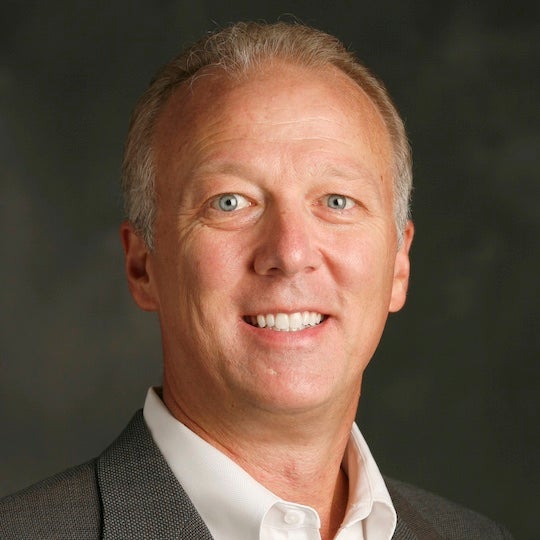Sweat the Boardroom, Not the Exam
Leading simulated meetings builds students’ real-world skills, says Teaching Fellow Bill Peterson

Marketing Bill Peterson
For years, Texas McCombs Assistant Professor of Instruction Bill Peterson split his days between teaching marketing and consulting with Austin companies. The contrast struck him.
“In the classroom, we relied on exams, papers, and presentations,” recalls Peterson, a former Dell Technologies marketing executive and McCombs Teaching Fellow in 2023–24. “But in business, that’s not how people make decisions or demonstrate their progress. Why should there be two worlds — the classroom and the business office — when we’re preparing students for business careers?”
Peterson set out to close that gap. He believed classroom assessments should not only measure what students know but also prepare them for the collaborative, high-stakes environments they’ll face after graduation.
Inside the Simulated Leadership Meeting
The solution became the simulated leadership meeting (SLM), modeled on the “product council” format many companies use to make product strategy decisions. Instead of writing a term paper or presenting slides at the front of the classroom, students in Peterson’s classes act as managers leading realistic meetings where they must present analyses, defend recommendations, and respond to tough questions from peers role-playing as executives.
Sometimes students choose real companies to analyze, and sometimes they role-play stakeholders in case studies Peterson poses.
He says part of the approach’s “secret sauce” is the required pre-meeting memo, where meeting owners share objectives, agendas, and summaries — just as executives do in corporate settings. Other role-playing members study the pre-meeting memo and come to class prepared with feedback.
Unlike traditional presentations, SLMs can unfold in surprising ways, Peterson says. Stakeholders are active participants, often pressing for clarification, pushing back on assumptions, or steering the conversation in unexpected directions. That uncertainty forces meeting leaders to think on their feet and adapt — skills central to effective business leadership.
To make efficient use of class time, Peterson runs multiple simultaneous meetings, booking nearby conference rooms or using Zoom. Students who might once have sat silently through a dozen short presentations — during which most of the class is unengaged or even bored — now fully participate in rich, hour-long discussions.
“The people that hire our graduates expect them to not just do analysis, but to drive complex decisions in their companies. I want to give students the skills and confidence they need to do that.”
— Bill Peterson, McCombs Teaching Fellow, 2023-2024
From Nerves to Confidence
“Students just love it,” Peterson says. “They realize they are building a skill to differentiate themselves from all of the test takers out there.”
There’s a steep learning curve in the first session of the semester, he says: “It’s evident a lot of the students fall back into their old ways of giving a formal presentation and reading slides. That’s what they’ve been conditioned to do.”
But with Peterson’s feedback, the students quickly grow. “After our first session, one student recently said, ‘You know what? It’s just a conversation. We’re just talking to people, trying to get to a good decision.’ And I said, ‘Exactly, and that’s exactly the way it’s going to work when you graduate.’”
Student evaluations have been overwhelmingly positive. One student calls the class project “one of the most difficult I have completed throughout my time at UT. It was also by far the most reflective of the real world.”
Others highlight how the uncertainty of SLMs deepens their learning. “Because we didn’t know what was going to come up, we had to have a better, deeper understanding of what we were talking about,” one student explained.
Spreading Across McCombs and Beyond
Faculty members are equally as enthusiastic: Between 2022 and 2024, five instructors across 13 McCombs undergraduate classes piloted the SLM format with support from Brandon Campitelli, assistant director for the McCombs Office of Instructional Innovation.
The methodology soon spread beyond McCombs. With Campitelli, Peterson refined his approach through the McCombs Teaching Fellows program, which helped him publish insights in Harvard Business Impact in late 2024. That article sparked interest from peers worldwide.
“Bill’s approach has been picked up by many colleagues within McCombs, and we’ve been contacted by colleagues here at UT Austin from the College of Natural Sciences and Texas Executive Education,” Campitelli says.
“We’ve seen it spread externally as well,” he adds. “Duke University, Northwestern College in Iowa, United States Air Force Academy, University of Central Florida, and West Coast University of Applied Sciences in Germany have all sought advice for adapting the SLM model to their own context and disciplines.”
Transforming Business Education
With the undeniable momentum of the approach, Peterson hopes more students enter the workforce ready to contribute in meaningful ways.
One recent alumna wrote to thank Peterson when she landed her first job: “My intro exercise for their interview process was to prep a consulting-style deck using some quant findings from a survey. In the following call, the partner was shocked at my product and immediately asked how I learned how to do it, saying, ‘It looks like someone who’s had five-plus years of experience in the industry.’ I immediately credited you and your classes,” she wrote.
Peterson says this marriage of the boardroom and the classroom will continue to shape students’ readiness for the workforce. “We have to give students a grade and give them some feedback — that’s something we have to do as teachers,” he says. “Simulated leadership meetings allow us to do that, but more importantly, they give students they will use to successfully drive their ideas through businesses.” Awards Committee for the 2024-25 Jim Nolen Award for Excellence in Graduate Teaching.
Story by Sandra Kleinsasser and Judie Kinonen
About this Post
Share:


